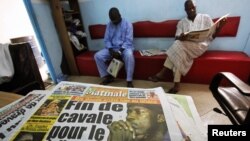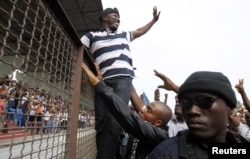ABIDJAN —
Authorities in Ghana this week arrested Charles Ble Goude, the leader of a youth group in Ivory Coast who was implicated in crimes and what are called "grave human rights violations" during his country’s 2010-11 post-election violence. But Human Rights Watch said Friday Ghana should not extradite Ble Goude to Ivory Coast unless it receives guarantees that he will get a fair trial and that he will not be subject to torture or inhuman treatment.
Authorities in both Ivory Coast and Ghana have been tight-lipped about how Ble Goude’s case will be handled, and whether he will be sent back to his home country after being on the run since April 2011.
Who is Ble Goude?
He was one of the most prominent fugitives from Ivory Coast’s post-election crisis, which erupted after former president Laurent Gbagbo refused to cede office despite losing the 2010 presidential runoff vote to the current president, Alassane Ouattara. The violence claimed more than 3,000 lives over the course of six months.
Ble Goude, a Gbagbo loyalist, was head of the Young Patriots, a group of Gbagbo supporters notorious for targeting Ouattara supporters at roadblocks set up throughout the commercial capital of Abidjan.
Matt Wells, West Africa researcher for Human Rights Watch, said the group was widely feared.
"Throughout the post-election crisis the Young Patriots set up roadblocks around Abidjan and would target northern Ivorians and West African immigrants who passed through, at times brutally beating them to death, shooting them at point blank range or even burning people alive merely because of the clothes they were wearing or their name," said Wells.
But Wells added that a court would have to determine whether Ble Goude had command responsibility for members of the group, and whether he incited his followers to violence through speeches and other declarations made during the crisis.
Justice in Ivory Coast
Rights groups have long questioned whether Ivory Coast is capable of trying cases related to the post-election violence fairly. Despite widespread evidence that both Gbagbo and Ouattara supporters committed atrocities, only Gbagbo supporters have been investigated and charged.
Mr. Ouattara’s government has also been accused of mistreating and sometimes torturing Gbagbo supporters held in military camps, especially after unknown gunmen began committing a series of attacks targeting military positions in August of last year. Ivorian authorities have largely denied the allegations.
Wells said that Ghana should not extradite Ble Goude if there is any threat that he might encounter ill treatment at the hands of Ivorian authorities.
"There have been a number of reports in recent months about inhuman treatment and torture in detention sites and military detention sites in Cote d’Ivoire, so it’s important to ensure there’s no threat against Ble Goude if Ghana is considering extradition," Wells added.
Ivorian authorities have charged Ble Goude with violent crimes and economic crimes.
Authorities in both Ivory Coast and Ghana have been tight-lipped about how Ble Goude’s case will be handled, and whether he will be sent back to his home country after being on the run since April 2011.
Who is Ble Goude?
He was one of the most prominent fugitives from Ivory Coast’s post-election crisis, which erupted after former president Laurent Gbagbo refused to cede office despite losing the 2010 presidential runoff vote to the current president, Alassane Ouattara. The violence claimed more than 3,000 lives over the course of six months.
Ble Goude, a Gbagbo loyalist, was head of the Young Patriots, a group of Gbagbo supporters notorious for targeting Ouattara supporters at roadblocks set up throughout the commercial capital of Abidjan.
Matt Wells, West Africa researcher for Human Rights Watch, said the group was widely feared.
"Throughout the post-election crisis the Young Patriots set up roadblocks around Abidjan and would target northern Ivorians and West African immigrants who passed through, at times brutally beating them to death, shooting them at point blank range or even burning people alive merely because of the clothes they were wearing or their name," said Wells.
But Wells added that a court would have to determine whether Ble Goude had command responsibility for members of the group, and whether he incited his followers to violence through speeches and other declarations made during the crisis.
Justice in Ivory Coast
Rights groups have long questioned whether Ivory Coast is capable of trying cases related to the post-election violence fairly. Despite widespread evidence that both Gbagbo and Ouattara supporters committed atrocities, only Gbagbo supporters have been investigated and charged.
Mr. Ouattara’s government has also been accused of mistreating and sometimes torturing Gbagbo supporters held in military camps, especially after unknown gunmen began committing a series of attacks targeting military positions in August of last year. Ivorian authorities have largely denied the allegations.
Wells said that Ghana should not extradite Ble Goude if there is any threat that he might encounter ill treatment at the hands of Ivorian authorities.
"There have been a number of reports in recent months about inhuman treatment and torture in detention sites and military detention sites in Cote d’Ivoire, so it’s important to ensure there’s no threat against Ble Goude if Ghana is considering extradition," Wells added.
Ivorian authorities have charged Ble Goude with violent crimes and economic crimes.







